- Clone
- 11-26c.2a (See other available formats)
- Regulatory Status
- RUO
- Other Names
- Immunoglobulin D
- Isotype
- Rat IgG2a, κ
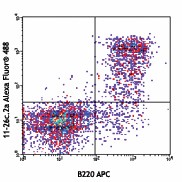
-

C57BL/6 splenocytes were stained with B220 APC and IgD (11-26c.2a) Alexa Fluor® 488 (top) or rat IgG2a, κ Alexa Fluor® 488 isotype control (bottom). -

-

Mice were injected subcutaneously with sheep red blood cells in a volume of 25 µl per site on days 0 and 4 and harvested on day 11. Confocal image of C57BL/6 mouse lymph node acquired using the IBEX method of highly multiplexed antibody-based imaging: PD-1 (green) in Cycle 1, CD23 (magenta) in Cycle 7, and IgD (blue) in Cycle 10. Tissues were prepared using ~1% (vol/vol) formaldehyde and a detergent. Following fixation, samples are immersed in 30% (wt/vol) sucrose for cryoprotection. Images are courtesy of Drs. Andrea J. Radtke and Ronald N. Germain of the Center for Advanced Tissue Imaging (CAT-I) in the National Institute of Allergy and Infectious Diseases (NIAID, NIH).
| Cat # | Size | Price | Quantity Check Availability | ||
|---|---|---|---|---|---|
| 405717 | 25 µg | $112.00 | |||
| 405718 | 100 µg | $265.00 | |||
Surface IgD is an important B cell differentiation marker.
Product Details
- Verified Reactivity
- Mouse
- Antibody Type
- Monoclonal
- Host Species
- Rat
- Formulation
- Phosphate-buffered solution, pH 7.2, containing 0.09% sodium azide.
- Preparation
- The antibody was purified by affinity chromatography and conjugated with Alexa Fluor® 488 under optimal conditions.
- Concentration
- 0.5 mg/ml
- Storage & Handling
- The antibody solution should be stored undiluted between 2°C and 8°C, and protected from prolonged exposure to light. Do not freeze.
- Application
-
FC - Quality tested
SB - Reported in the literature, not verified in house
- Recommended Usage
-
Each lot of this antibody is quality control tested by immunofluorescent staining with flow cytometric analysis. For flow cytometric staining, the suggested use of this reagent is ≤0.5 µg per million cells in 100 µl volume. It is recommended that the reagent be titrated for optimal performance for each application.
* Alexa Fluor® 488 has a maximum emission of 519 nm when it is excited at 488 nm.
Alexa Fluor® and Pacific Blue™ are trademarks of Life Technologies Corporation.
View full statement regarding label licenses - Excitation Laser
-
Blue Laser (488 nm)
- Application Notes
-
The 11-26c.2a antibody reacts with immunoglobulin D in all tested mouse haplotypes. The antibody binds membrane IgD expressed on most B cells. The 11-26c.2a antibody neither induces proliferation of splenic B cells nor induces B cell activation. Additional reported applications (for the relevant formats) include: immunohistochemical staining of acetone-fixed frozen sections2,3, and spatial biology (IBEX)10,11.
- Additional Product Notes
-
Iterative Bleaching Extended multi-pleXity (IBEX) is a fluorescent imaging technique capable of highly-multiplexed spatial analysis. The method relies on cyclical bleaching of panels of fluorescent antibodies in order to image and analyze many markers over multiple cycles of staining, imaging, and, bleaching. It is a community-developed open-access method developed by the Center for Advanced Tissue Imaging (CAT-I) in the National Institute of Allergy and Infectious Diseases (NIAID, NIH).
-
Application References
(PubMed link indicates BioLegend citation) -
- Nitschke L, et al. 1993. P. Natl. Acad. Sci. USA 90:1887. (FC)
- Weih D, et al. 2001. J. Immunol. 167:1909. (IHC)
- Koni PA, et al. 2001. J. Exp. Med. 193:741. (IHC)
- Ahuja A, et al. 2007. J. Immunol. 179:3351. (FC) PubMed
- Haynes NM, et al. 2007. J. Immunol. 179:5099. (FC)
- Good-Jacobson KL, et al. 2010. Nat. Immunol. 11:535. (FC) PubMed
- Tomayko MM, et al. 2010. J. Immunol. 185:7146. PubMed
- Park SY, et al. 2013. J. Immunol. 190:1094. PubMed
- Rouaud P, et al. 2014. J Exp Med. 211:975. PubMed
- Radtke AJ, et al. 2020. Proc Natl Acad Sci U S A. 117:33455-65. (SB) PubMed
- Radtke AJ, et al. 2022. Nat Protoc. 17:378-401. (SB) PubMed
- Product Citations
-
- RRID
-
AB_10730618 (BioLegend Cat. No. 405717)
AB_10730618 (BioLegend Cat. No. 405718)
Antigen Details
- Structure
- Ig family
- Distribution
-
B cells
- Function
- B cell differentiation
- Cell Type
- B cells
- Biology Area
- Immunology
- Gene ID
- 380797 View all products for this Gene ID
- UniProt
- View information about IgD on UniProt.org
Other Formats
View All IgD Reagents Request Custom ConjugationCompare Data Across All Formats
This data display is provided for general comparisons between formats.
Your actual data may vary due to variations in samples, target cells, instruments and their settings, staining conditions, and other factors.
If you need assistance with selecting the best format contact our expert technical support team.
-
FITC anti-mouse IgD
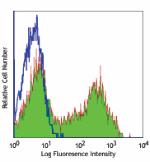
C57BL/6 mouse splenocytes stained with 11-26c.2a FITC -
PE anti-mouse IgD
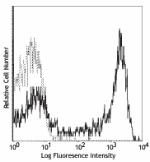
C57BL/6 splenocytes stained with 11-26c.2a PE -
Purified anti-mouse IgD
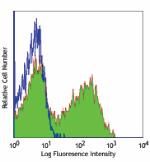
C57BL/6 mouse splenocytes stained with purified 11-26c.2a, f... -
PerCP anti-mouse IgD
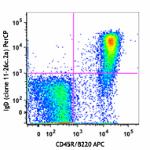
C57BL/6 mouse splenocytes were stained with CD45R/B220 APC a... 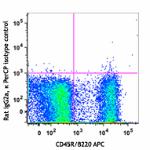
-
Biotin anti-mouse IgD
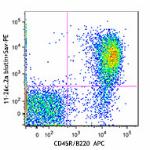
C57BL/6 splenocytes were stained with CD45R/B220 APC and bio... 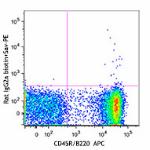
-
Brilliant Violet 711™ anti-mouse IgD
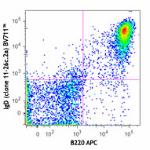
C57BL/6 mouse splenocytes were stained with B220 APC and IgD... 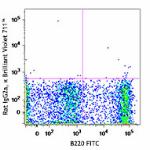
-
Alexa Fluor® 700 anti-mouse IgD
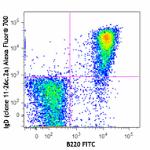
C57BL/6 mouse splenocytes were stained with B220 FITC and Ig... 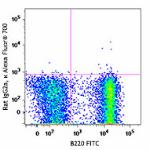
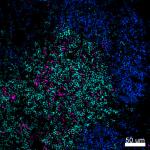
Confocal image of C57BL/6 mouse spleen sample acquired using... 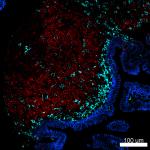
Confocal image of C57BL/6 mouse small intestine sample acqui... -
Alexa Fluor® 647 anti-mouse IgD
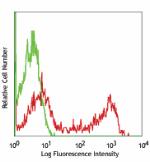
C57BL/6 splenocytes stained with 11-26c.2a Alexa Fluor® 647 
Paraformaldehyde-fixed (4%), 500 μm-thick mouse spleen secti... -
PerCP/Cyanine5.5 anti-mouse IgD
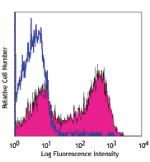
C57BL/6 splenocytes stained with 11-26c.2a PerCP/Cyanine5.5 -
Pacific Blue™ anti-mouse IgD
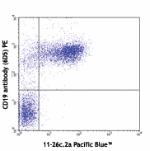
C57BL/6 splenocytes stained with 11-26c.2a Pacific Blue&trad... 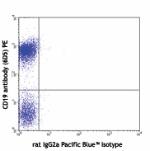
C57BL/6 splenocytes stained with rat IgG2a Pacific Blue&trad... -
APC anti-mouse IgD
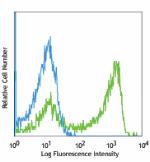
C57BL/6 splenocytes stained with 11-26c.2a APC -
APC/Cyanine7 anti-mouse IgD
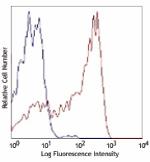
C57BL/6 splenocytes stained with 11-26c.2a APC/Cyanine7 -
Alexa Fluor® 488 anti-mouse IgD
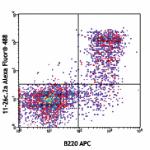
C57BL/6 splenocytes were stained with B220 APC and IgD (11-2... 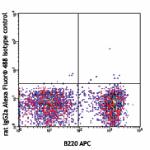
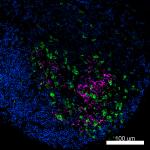
Mice were injected subcutaneously with sheep red blood cells... -
PE/Cyanine7 anti-mouse IgD

C57BL/6 splenocytes were stained with CD45R/B220 FITC and Ig... -
Brilliant Violet 650™ anti-mouse IgD
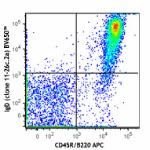
C57BL/6 splenocytes were stained with CD45R/B220 APC and IgD... 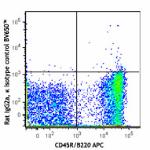
-
Brilliant Violet 510™ anti-mouse IgD
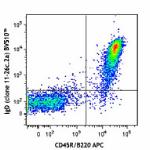
C57BL/6 splenocytes were stained with CD45R/B220 APC and IgD... 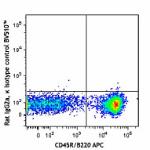
-
Brilliant Violet 421™ anti-mouse IgD
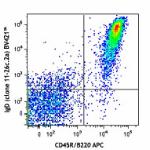
C57BL/6 splenocytes were stained with CD45R/B220 APC and IgD... 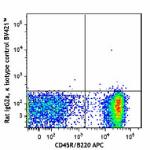
-
Brilliant Violet 605™ anti-mouse IgD
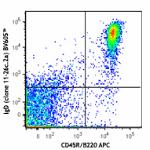
C57BL/6 splenocytes were stained with CD45R/B220 APC and IgD... 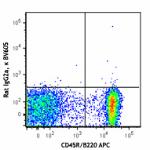
-
Purified anti-mouse IgD (Maxpar® Ready)
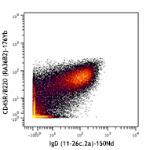
C57BL/6 mouse splenocytes stained with 176Yb-anti-CD45R/B220... -
Alexa Fluor® 594 anti-mouse IgD
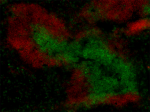
C57BL/6 mouse frozen spleen section was fixed with 4% parafo... 
Paraformaldehyde-fixed (4%), 500 μm-thick mouse spleen secti... -
PE/Dazzle™ 594 anti-mouse IgD
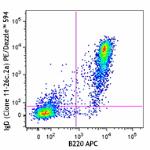
C57BL/6 mouse splenocytes were stained with B220 APC and IgD... 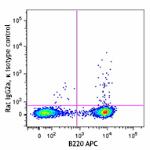
-
APC/Fire™ 750 anti-mouse IgD
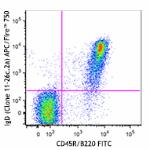
C57BL/6 mouse splenocytes were stained with CD45R/B220 FITC ... 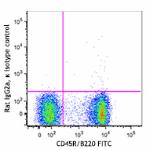
-
TotalSeq™-A0571 anti-mouse IgD
-
TotalSeq™-C0571 anti-mouse IgD
-
Spark NIR™ 685 anti-mouse IgD

C57BL/6 splenocytes were stained with anti-mouse CD45R/B220 ... -
TotalSeq™-B0571 anti-mouse IgD Antibody
-
Spark Violet™ 423 anti-mouse IgD

C57BL/6 splenocytes were stained with anti-mouse/human CD45R... -
PE/Cyanine5 anti-mouse IgD

C57BL/6 mouse splenocytes were stained with anti-mouse B220 ... -
Brilliant Violet 785™ anti-mouse IgD

C57BL/6 mouse splenocytes were stained with anti-mouse B220 ... -
Spark PLUS UV395™ anti-mouse IgD

C57BL/6 mouse splenocytes were stained with anti-mouse CD45R...
